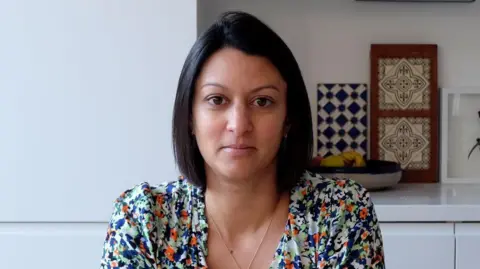
 Instagram/Bella Humphries
Instagram/Bella HumphriesTelling hilarious or embarrassing stories from your personal life is something many stand-up comedians do night after night on stage.
But what about turning your periods into a laughing matter?
That’s what comedian Bella Humphries has done for her debut show at the Edinburgh Fringe, after being diagnosed with Premenstrual dysphoric disorder (PMDD).
Symptoms of the condition can include extreme mood swings, depression and anxiety.
But with another two weeks of the Fringe still to go, one of Bella’s jokes has already been named by the Times as among the festival’s best.
‘Finding the funny’
Living with suicidal thoughts every month was something Humphries had become used to.
These kinds of extreme symptoms started a week before her period when she was in what’s known as the luteal phase of her menstrual cycle and for years she had believed it was completely normal.
That is, until she was diagnosed with PMDD, which could affect up to 8% of people who have periods in the UK.
”I had a lot of thoughts of about hurting myself or not wanting to be alive anymore,” Humphries tells BBC News. “And I was, yeah, really in quite a dark place.”
The comedian says didn’t know anything about the condition until she started to look up some of her symptoms online and was eventually diagnosed by a private doctor.
Now she’s turned her experiences of living with PMDD into a stand-up routine for her show Square Peg.
The 30-year-old says sharing her experiences of it on stage has felt ”very empowering” because she’s been ”able to find the funny in some really dark times”.
“It is very personal. It’s very honest, a bit raw at times, but still very funny, I think,” she reflects. “And I have been told that by lots of other people.”

One of the jokes, which referenced having suicidal thoughts, made it into a list of the Times’ top jokes from the Fringe.
The joke was: ”There are times I feel so low I think the only way out is to get in my car and drive as fast as I can into a tree. But I’d never go through with it because I’m a feminist and I wouldn’t want that legacy for female drivers.”
Humphries says she wants to raise awareness of her condition through her comedy, which she’s hoping could lead to more people being diagnosed sooner.
”I’ve had a lot of women come to the show of varying ages, but it had such positive responses,” says the comedian.
She suggests it’s relatable for many people, even if they haven’t heard of the condition.
”And it made a lot of people feel quite emotional which is really nice to hear, because, yeah, it’s been quite emotional for me making it.”
What is PMDD?
Premenstrual dysphoric disorder (PMDD) is an extreme form of PMS (Premenstrual syndrome).
Symptoms can include:
- headaches and joint and muscle pain
- overeating and problems sleeping
- feeling very anxious, angry, depressed or suicidal
It’s not clear what causes PMDD, but it’s been linked to being very sensitive to changes in hormones, or certain differences in the genes you inherit from your parents.
Treatments can include hormonal medicine, such as the combined contraceptive pill, cognitive behavioural therapy and antidepressants.
‘Taboo topic’
Farah Raja, who was diagnosed with PMDD last year, says hearing it being spoken about it in a public setting is “really important” and she hopes it will help more young people to recognise their symptoms and get an earlier diagnosis.
‘’When I first started, experiencing symptoms, I had no idea like that I was actually dealing with a severe form of PMS,” Farah tells BBC News.
“And I feel like for so long, PMS has been mocked and kind of trivialized, and people don’t really take it seriously.”
The 27-year-old, who posts TikTok videos to raise awareness of the condition, says growing up in a South Asian culture meant periods were seen as a ”very taboo topic”.
“I think that’s what made it so hard for me to get a diagnosis in the first place, because I was just constantly under the impression that it’s like nobody should know. So there’s something that I just kind of kept to myself for a really long time, or just try to suffer through.”

Claire Phipps, a doctor specialising in women’s health, says health experts need more education on how to spot the signs that someone has PMDD.
“I think it’s misdiagnosed a lot of the time because women’s health has been neglected for generations,” she explains.
Dr Phipps believes it is much more common than figures suggest because there isn’t enough awareness around the issue.
“It’s something that’s not talked about enough and women are really suffering,” she says.
“When it’s spoken about in this way, like being turned into a comedy, it’s almost like a public health warning, showing people that these symptoms aren’t normal and you don’t have to just put up with them”.

Lottie Dickens says she knew something was wrong as soon as her periods started.
For two weeks out of her menstrual cycle, she would experience extreme fatigue, depression and feelings of hopelessness, like nothing is ever going to get better.
Eventually she ended up being signed off work because the symptoms had got so severe.
After seeing multiple doctors over seven years, Lottie was ultimately diagnosed with PMDD.
“I burst into tears because it just felt so validating to have someone listen to me,” says the 29-year-old.
More education is something she’s also calling for. “It’s crazy that we don’t get taught this in schools,” Lottie says. “It would’ve been so useful to know what is and isn’t normal when it comes to your hormones and your period.”
And she praises Humphries for bringing this topic to light.
“The more people are aware of it, the more acceptance there will be that we’re dealing with something completely out our control.”
Bella Humphries: Square Peg is at Just the Tonic at the Mash House until 25 August.



Be the first to comment